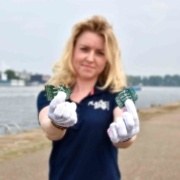20 August 2020
Are we getting sick of bacteria on microplastics in shellfish? Bacteria, including pathogens, thrive on (micro)plastics. Thanks to these plastic particles in oysters or mussels, pathogens can reach the consumer’s plate.
The world’s population is increasingly dependent on aquaculture for its food supply. This sector is rapidly growing in size and focuses, among other things, on the cultivation of mussels and oysters in coastal waters. Plastic pollution is also increasing, and it is well known that bivalve shellfish eat microplastics. How risky is the combination of these things?
Two studies on this subject appeared almost simultaneously. An overview study deals with the existing knowledge about the risks of spreading pathogens via microplastics at sea. The second study describes the pollution of farmed oysters off the coast of Myanmar.
INCREASING DEPENDENCE ON AQUACULTURE
The combination of overfishing and the growth of the world population makes aquaculture increasingly essential to meet the global demand for food. Aquaculture for farming mussels and oysters in coastal waters is growing in Southeast Asia and elsewhere. In that region, it is estimated that only 14% of wastewater is treated. Urbanisation and the lack of water treatment plants are the main reasons why much of the sewage water enters the sea untreated and also affects aquaculture.
BIOFILM OR PLASTISPHERE
Even the smallest plastic particle in the sea develops a layer of microbic life. The microbial biofilm, also called plastisphere, consists of many types of bacteria, including potential pathogens for humans and animals. Microplastics with biofilm end up in organisms such as shellfish that filter seawater and are cultivated for human consumption. With the untreated wastewater, a lot of plastic also flows into the sea. Thanks to floating plastic, bacteria that attach themselves to that plastic can move over long distances.
POLLUTED OYSTERS OFF THE COAST OF MYANMAR
Using a DNA sequence technology, water, sediment and culture oysters in the Mergui Archipelago of Myanmar were analysed. The researchers found 5,459 potential human pathogens of 87 types of bacteria, more than half of which are harmful to human health.
By filtering water, the culture oysters receive not only microplastics, but also other particles. Infrared spectroscopy was used to detect 78 different contaminants, up to eighty kilometres off the coast! In addition to microplastics (48%), these included paints, cosmetics, talc and kerosene. Remarkable was the presence of milk powder for babies in oysters (14%). This is regarded as a strong indication of a direct relationship between untreated sewage water and the pollution observed in Myanmar.
RESEARCH INTO PATHOGENS ON MICROPLASTICS
The scientists advocate more research into food safety and the use of new techniques to identify potential risks. They point out that it is not a local problem, but one that affects the whole world. The oysters from Myanmar are sold around the world (via China), and there are many similar situations in other countries.
It is not yet known if we also get sick when we ingest microplastics with pathogens on them. Research into this is currently being conducted in the Netherlands.
Photo by David Todd McCarty
YOU MIGHT ALSO BE INTERESTED IN IT:





